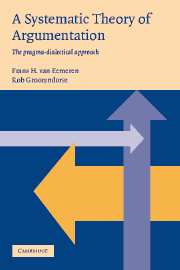6 - Rules for a critical discussion
Published online by Cambridge University Press: 12 January 2010
Summary
A critical-rationalistic view of reasonableness
Words like “rational” and “reasonable” are used in and out of season in ordinary language. It is often unclear exactly what they are supposed to mean, and even if it is clear, the meaning is not always consistent. An extra difficulty is that the senses in which these words are used are not so precisely defined either. For ordinary usage, this is usually not necessary, but if we are to use these terms technically, we have to decide what they mean. This is particularly the case in the study of argumentation, where a systematic attempt is made to indicate whether or not an argumentation is valid (in the informal sense of problem valid and intersubjectively valid discussed in Chapter 2). The terms reasonable and rational play a crucial role here, since the evaluation of validity is put in the hands of a “rational critic who judges reasonably.”
To start with the dictionary definitions, the Oxford English Dictionary distinguishes the following meanings of “reasonable”:
Endowed with the faculty of reason; rational
In accordance with reason; not irrational or absurd
Proportionate
Having sound judgement; ready to listen to reason, sensible
Within the limits of reason; not greatly less or more than might be thought likely or appropriate; moderate; of a fair, average, or considerable amount, size, etc.
Articulate
Requiring the use of reason
The meanings “proportionate” (3), “articulate” (6), and “requiring the use of reason” (7) are not so relevant here, nor is (5) in the sense of “The weather was reasonable” or “My English is reasonable.
- Type
- Chapter
- Information
- A Systematic Theory of ArgumentationThe pragma-dialectical approach, pp. 123 - 157Publisher: Cambridge University PressPrint publication year: 2003



